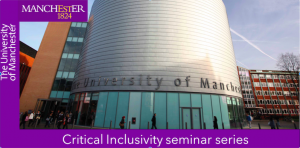
Critical Inclusivity Seminar Series
Critical Inclusivity Seminar – Education, disadvantage and place
The first of our Critical Inclusivity seminar series was held last week with Dr Carl Emery as our special guest and chaired by Siân Morgan. The theme for this first seminar was education, disadvantage and place, based around Carl’s research interests. It was encouraging to see so many secondary PGCE students, teachers from our partnership schools, and university tutors enthusiastically discussing these issues and asking insightful questions. One student reflected that “The seminar was amazing: Carl’s passion is contagious and the topic really meaningful!”
We plan to have many future seminars that allow participants to discuss and debate issues related to equality, diversity and inclusion in secondary education.
PGCE English student teacher, Tasneem Perry, gives her reflection on the first seminar
The first Critical Inclusivity Seminar with Dr Carl Emery really honed in on some of the questions I am facing as a PGCE Secondary English student. My first placement is in a leafy, long-established Grammar School. I see many of my students completely oblivious to the realities of disadvantage, even when one of their texts in class is Stone Cold, a realistic young-adult novel by Robert Swindells about homelessness.
I find myself enjoying the safety and comfort of my first placement, even while I know that the reason why I wanted to get into teaching was to make a difference. I wonder how much of a difference I am making here – even while I realise that as the only teacher of colour in the school that I have seen thus far (and I am nearly at the end of my placement), I am a very visible symbol of diversity and inclusivity.
I am constantly comparing the privileges of my students with the environs where I live. The things they take for granted, for example, and their experiences of COVID 19 lockdown are very different to the lived realities that I know were part of my local community. In the seminar, Dr Emery responded to questions and he spoke of the realities of the intersections of class, race and disadvantage. It especially resonated with me when he spoke about the way rhetoric tries to divide people into fuel poor, or food poor – and he stressed that it is just all “economic poverty”, and that it is unhelpful for anyone but politicians to use other definitions.
Dr Emery also spoke about how important it is, as teachers, for us not to dismiss our more disadvantaged students and their parents, just because they don’t fit into the narrow definitions of what is acceptable in the middle-class rhetoric. We don’t need to turn our working class students into middle-class students, and their cultural backgrounds are just as rich and as valuable as the middle-class ones that are upheld as somehow more correct in education. I think the inverse is also true. Coming back to school, to my lovely, leafy school, I am more determined than ever that I do have a massive amount to contribute. I can teach my students to have greater empathy for the disadvantaged, and that the lessons I have been crafting thus far, motivated by wanting to advance racial and social equality is worth doing.
Tasneem Perry, English PGCE student teacher




0 Comments